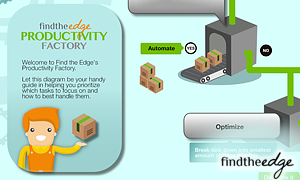 In my last article, I gave you all the tips you need to make an impact at events and enjoy a surge of business as a result. The key is to know what you want to achieve from these events, and to try and establish yourself as an expert if at all possible.
In my last article, I gave you all the tips you need to make an impact at events and enjoy a surge of business as a result. The key is to know what you want to achieve from these events, and to try and establish yourself as an expert if at all possible.
And what better way to do this than organise the event yourself? You'll instantly be seen as THE expert in the minds of everyone who attends, and will be able to ensure every element of the event is tailored towards your audience.
You will have more control over every aspect of the event than anyone else.
It may sound like a lot of work – and it will be – but that's no reason not to do it. The results can be astounding. It's also a great way to socialise with the movers and shakers in your niche.
Here's how you can organise your own seminar, conference or trade show in ten easy steps:
1. Decide on possible topics
You're the boss, so you can choose the theme. There are loads of events on, so it makes sense to focus heavily on your own niche to try and offer something different.
Try and find an angle that isn’t being covered that you think people will be interested in.
2. Do your research
It's important to research your idea before you make any firm commitments. At this stage, you can still get out if it's a bad idea.
Spend time making sure there's an audience for what you're doing, and that enough people will actually show up.
Survey your potential audience about whether they'd be likely to come, and what kind of content they'd be looking for.
3. Choose a venue
Don't make the mistake of choosing a venue first.
You'll need to know how many are likely to come, and how you want to structure your event before you finalise a venue.
Having three people spread across a 200-seater conference hall won't look great, and turning away hundreds of potential clients or leads isn't exactly good business either (although that’s a very nice and rare problem to have).
Put on a small event to start with – you can always increase in size next time or, if the venue has extra space, you might be able to upgrade if the demand is there. Limiting the attendance will allow you to use some scarcity marketing to create a buzz, sell out fast and get people excited.
4. Book some good speakers
You need to give people a reason to attend. A major part of that will be the array of high quality expert speakers who will be present.
Where possible pick people you know of and like – if you're enthusiastic about them, it will show, and the attendees will be too. Think about who your audience would like to see and what they'd like to take away from attending. Again, you can survey them on this.
If you're planning on running concurrent speakers in different rooms, make sure you put the most popular speakers or most popular topics in the bigger rooms.
This may sound obvious, but I was once invited to speak at a conference in Leeds (which was my second ever speaking gig) where most of the attendees were digital marketing agency staff.
I was an entrepreneur speaking about domain name trading and was given the biggest room, whilst Paddy Moogan from Distilled was in a small room talking about the hot topic of the time: Link Building. Someone else from another digital marketing agency was on in the other small room talking about an even hotter topic at the time Social Media.
Needless to say their rooms were packed and my big room was like a ghost town.
Don't forget about yourself, either – it's your event so get up there and either MC the event, present or both.
5. Plan
This can't be emphasised enough. You're putting your reputation on the line by running a seminar, and you don't want to forever be thought of as ‘that person who put on a crappy seminar.'
The secret to avoiding this is to plan like you've never planned before.
Think of every eventuality – what will you do if there's a power cut and the projectors don't work? What if your keynote speaker gets stuck in traffic?
Sit down and work out a clear schedule for what you need to do – with strict deadlines. Think about everything from accommodation for guests, to running a minibus from the local train station to ferry arrivals to the conference.
6. Approach sponsors
Hiring a venue won't be cheap, and you may want to include the cost of food and hand-outs within the ticket price. The problem is that this can bloat the cost and put people off attending.
The simple solution is to get your event sponsored. That way you'll find it much easier to keep the costs down, and will really be able to wow your audience.
Don't waste your time approaching unrealistic sponsors. Instead, think about companies that are likely to fit the bill and target these. They will want:
- To reach an audience of people likely to buy their product/service
- To reach important people within your niche
- To have confidence that the event will be well attended
- ROI
Also, think about what you can offer them. Consider the following:
- Their logo on all presentation slides
- The opportunity for a representative to introduce speakers
- A stall where they can sell their product/service
- Banners and adverts
- The chance to provide a meal, drinks or quiz prizes
Once you've thought about these factors, it should be relatively easy to find businesses that are likely to be interested, and willing to furnish you with the right amount of cash.
7. Market, market and market
Now you've got the foundations of a great event in place, it's time to make sure it pays for itself, and get the word out there.
Make sure you have a good budget for marketing.
Spread the message via word of mouth, blog posts, videos, social media and focussed adverts/PPC if you have the budget.
You may also want to offer an affiliate commission to speakers and other possible affiliates, so they are motivated to promote it to their databases.
8. Be the expert
When your event rolls around, you shouldn't be afraid to squeeze every last drop of value out of it.
You'll automatically be seen as an expert authority by the attendees – why else would you be in a position to host your own conference or seminar?
You'll get all the great opportunities to generate leads that I mentioned in my last article, and you'll find that all sorts of people sidle up to talk to you, knowing you're the person in charge.
9. Get their contact details
Don’t relax once the event is about to start. You should think about the future – who knows, this may turn into an annual, quarterly or even monthly event.
Make sure you get their email as a minimum when they sign up. Once they have paid you should try and get other details so you can instigate future engagement. You have the opportunity to create a highly focussed list of interested audience members who you can contact about future events, and engage with about other value adding projects.
10. Do it right
Organising your own event will take time, energy and commitment, but it could be the making of you.
Committing to putting on a great event, that gives every single attendee more value than they could have imagined, is the first step to unlocking previously hidden doors, and generating a steady stream of business enquiries, leads, opportunities and, of course, ‘authority’ in your marketplace.





